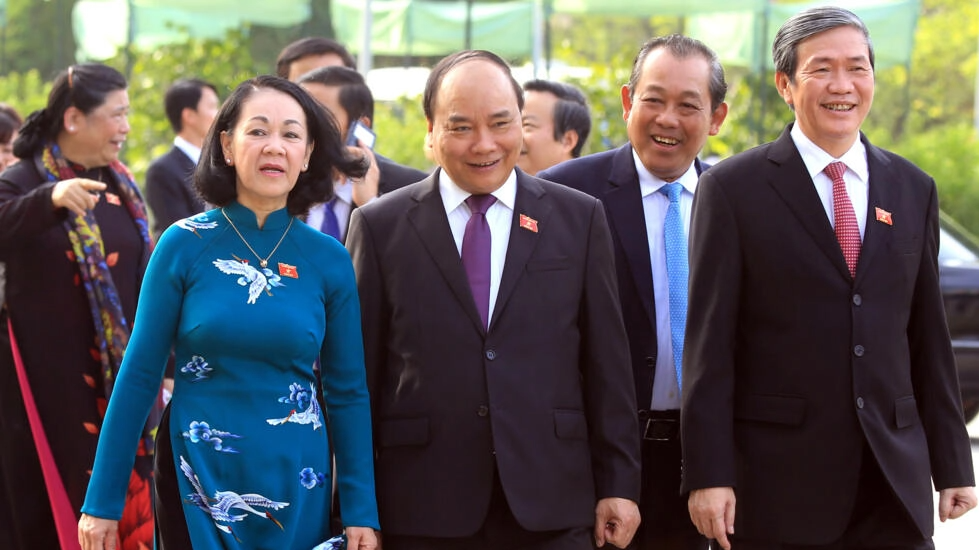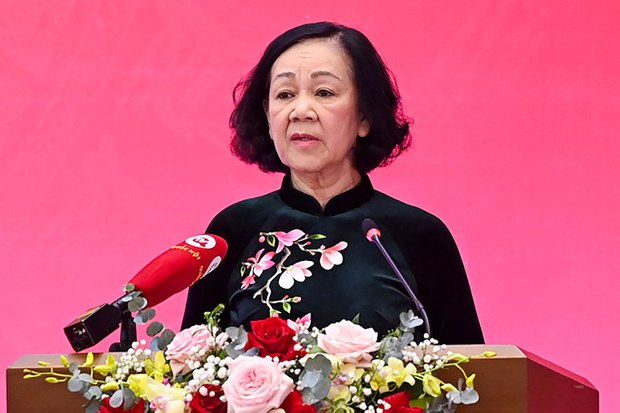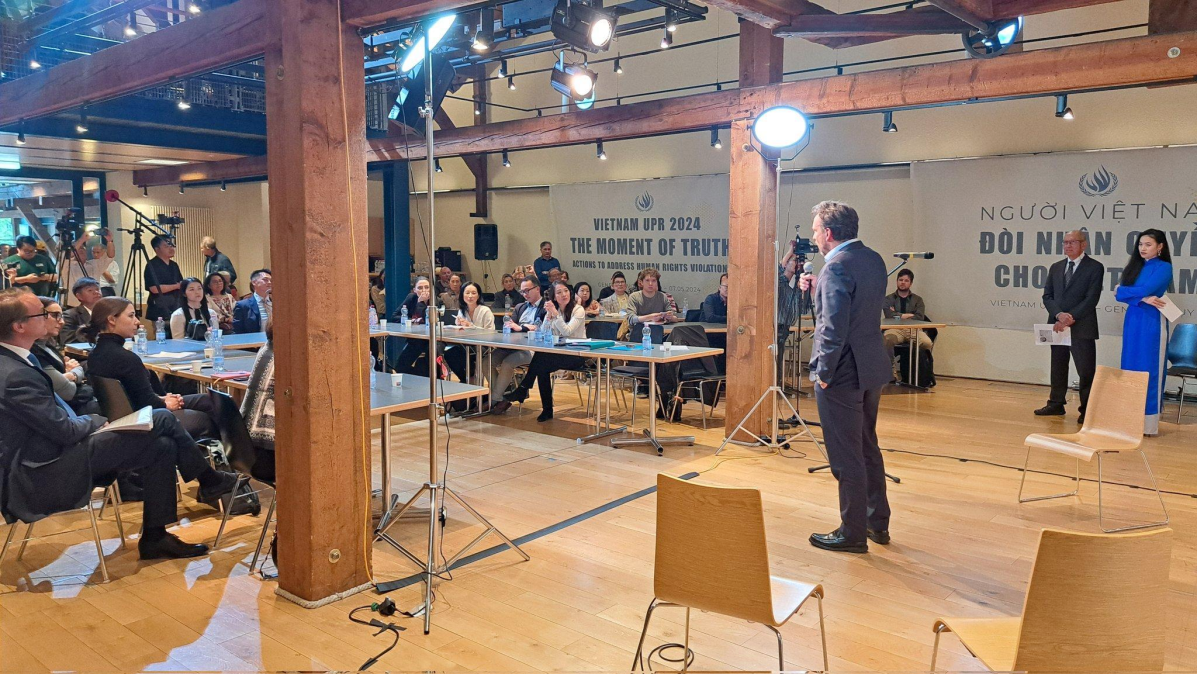
Trước ngày ông Nguyễn Tấn Dũng lên đường đi Anh Quốc, nhật báo Financial Times ở London đã phỏng vấn ông về tình hình kinh tế Việt Nam. Nguyễn Tấn Dũng nói muốn giữ cho sản lượng kinh tế Việt Nam năm nay tăng từ 8-9%; sẽ cố giảm số lạm phát từ gần 16% lúc đầu năm xuống chỉ còn 12% vào cuối năm; và sẽ tăng số hàng xuất cảng thêm 20%, so với năm ngoái.
Mục tiêu cuối cùng có thể dễ thực hiện nhất nếu dốc lực vào việc xuất cảng. Khi nhà nước nắm trong tay các công ty xuất cảng, cố giữ hối suất thấp để dễ cạnh tranh, còn ở trong nước thì buộc công nhân phải lãnh lương rất thấp, thì có thể hạ thấp giá hàng bán ra ngoài. Tổng số xuất cảng có thể tăng lên, các công ty xuất khẩu sẽ có lời; mọi thiệt thòi đã có giới lao động chịu đựng.
Mục tiêu khó đạt hơn, là làm sao đẩy lạm phát thấp xuống. Chống lạm phát khó, không phải vì thiếu những phương cách kiềm chế. Khó, vì các biện pháp ngăn ngừa lạm phát sẽ buộc các ngân hàng và doanh nghiệp nhà nước sẽ phải bớt xài tiền. Bớt xài tiền thì cũng bớt cơ hội kiếm chác. Các đảng viên cao cấp sẽ chống, mà không biết những người cầm đầu đảng Cộng Sản có đủ sức cưỡng lại họ hay không!
Tháng trước, giá sinh hoạt ở Việt Nam tăng theo tốc độ 15.7% một năm. Tại các thành phố lớn thì giá cả còn tăng nhanh hơn. Trong các món hàng tiêu thụ, thực phẩm tăng giá nhanh nhất, trên 20%. Riêng tại Sài Gòn giá thức ăn trung bình tăng một phần tư hơn năm ngoái. Khi thức ăn lên giá, người nghèo chịu thiệt hại nhất.
Ðể ngăn chặn lạm phát, có hai loại thuốc thường dùng. Một là dùng chính sách tiền tệ để giảm số tiền các ngân hàng cho vay. Như tăng lãi suất, tăng dự trữ bắt buộc, hoặc bán công trái để nhà nước vay tiền, thu về bớt số tiền ở trong dân chúng. Với các biện pháp tiền tệ đó, số tiền lưu hành giảm bớt, sức tiêu thụ giảm theo, giá cả sẽ không tăng nhanh nữa.
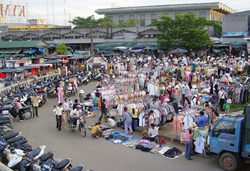
Nhưng chỉ riêng các biện pháp tiền tệ chưa đủ để kiềm chế lạm phát. Giảm bớt số chi tiêu của guồng máy nhà nước cũng là một cách bớt số tiền đổ vào trong nền kinh tế, tức là bớt lạm phát.
Hai loại biện pháp tiền tệ và công chi cần hỗ trợ lẫn nhau. Nếu chỉ thắt chặt trong lãnh vực tiền tệ mà thả lỏng trong việc chi tiêu, thì sẽ không đạt được hiệu quả. Dùng biện pháp tiền tệ để hạn chế số tiêu thụ trong dân mà nhà nước vẫn tiếp tục chi tiêu nhiều hơn, thì không thể ngăn ngừa lạm phát được.
Trong cuộc phỏng vấn với nhật báo Financial Times, ông Nguyễn Tấn Dũng đã nhấn mạnh sẽ giảm lạm phát từ gần 16% xuống 12% vào cuối năm nay. Nhưng ông Dũng phải thú nhận với nhà báo rằng trong năm ngoái nhà nước cộng sản đã thất bại. Họ đã tăng lãi suất, tăng số dự trữ bắt buộc ở các ngân hàng thương mại; nhưng vẫn chưa kiềm chế được số lượng tiền tệ lưu hành. Lý do chính là số tín dụng vẫn gia tăn. Nói cách khác, cả guồng máy kiểm soát tài chánh của đảng Cộng Sản không ngăn được các ngân hàng của đảng đem tiền cho các xí nghiệp của đảng vay!
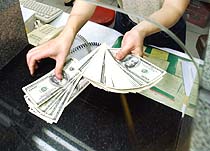
Tại sao họ không kiểm soát được lẫn nhau? Ông Nguyễn Tấn Dũng giải thích rằng các ngân hàng và các doanh nghiệp của nhà nước đều làm ăn theo quy tắc của kinh tế thị trường, ai có tiền cho vay cứ cho vay, ai vay được mà dùng tiền kiếm ra lời thì cứ di vay, không cản được! Tóm lại, đảng và nhà nước cộng sản cũng không bảo được các đảng viên cộng sản phải ngưng “làm kinh tế” kiếm lời! Hậu quả là toàn dân phải chịu cảnh lạm phát, xăng gạo cái gì giá cũng lên, nhưng đó là việc của người khác, không phải trách nhiệm của các đảng viên làm việc kinh doanh! Ông Nguyễn Tấn Dũng đổ lỗi tại thị trường, nhưng ông quên rằng ở Việt Nam bây giờ chưa phải thị trường thật, chỉ có một thứ thị trường theo định hướng xã hội chủ nghĩa! Ðảng Cộng Sản đã tạo ra một khung cảnh kinh tế, khung cảnh đó khuyến khích các ngân hàng của đảng cho vay và các xí nghiệp của đảng đi vay, tín dụng tăng lên gây cảnh lạm phát khiến toàn dân phải chịu. Nếu tư nhân được hoạt động tự do, nếu đảng Cộng Sản không nắm độc quyền để nâng đỡ các đảng viên cao cấp, thì các chính sách tiền tệ sẽ có hiệu quả hơn.
Một cách cụ thể, theo định hướng xã hội chủ nghĩa là thế nào? Một mặt, chính sách của đảng Cộng Sản là kiểm soát và hạn chế các cơ hội đầu tư của tư nhân, bắt buộc dân chúng hễ có chút tiền là chỉ có cách gửi vô ngân hàng. Ðó là chính sách hút hết tiền của dân vào cho các đảng viên cao cấp ngân hàng sử dụng. Ngân hàng của nhà nước trả mức lời rất thấp, cho nên ngân hàng chỉ cần cho vay với lãi suất cao hơn chút đỉnh là đủ kiếm ăn thoải mái rồi.
Trong guồng máy độc quyền cai trị của đảng Cộng Sản, các xí nghiệp nhà nước cùng với các ngân hàng cũng của nhà nước đều liên kết với nhau trong quan hệ trong đảng; tiền bên ngân hàng được chuyển sang cho các xí nghiệp sử dụng không cần biết đến hiệu quả kinh doanh! Ở các nước kinh tế thị trường thật, khi cho vay là ngân hàng phải tra hỏi người muốn vay có dự án đầu tư như thế nào. Trong một nước cộng sản, chỉ cần đảng nói một tiếng là đủ.
Nhưng mặt khác, đảng Cộng Sản Việt Nam cũng tạo cơ hội kiếm tiền cho các xí nghiệp của đảng. Nhật báo Financial Times cho biết rằng rất nhiều các doanh nghiệp nhà nước cộng sản khi vay được tiền họ không dùng để phát triển các hoạt động mà lại dùng tiền để đầu cơ đất đai, nhà cửa! Nghĩa là tiền vay để cho các sếp lớn kinh doanh nhưng không giúp tạo thêm công việc làm cho giới lao động, không giúp kinh tế phát triển!
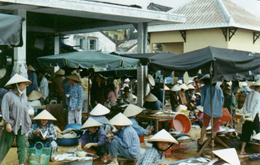
Tại sao các đảng viên có cơ hội làm giầu dễ dàng như vậy? Cũng chính đảng Cộng Sản, không cho tư nhân được làm chủ đất, đã tạo ra cảnh giá nhà đất tăng vùn vụt trong mấy năm qua, để cho các nhà tư bản đỏ kiếm lời! Việc thay đổi quyền sử dụng đất ở các vùng chung quanh thành phố hoàn toàn cho các đảng viên cao cấp quyết định; tất cả đã tạo cơ hội cho những người có quan hệ với guồng máy đảng và nhà nước tha hồ đầu cơ đất đai trục lợi! Nếu trong một nền kinh tế tự do thật sự, các đảng viên không có nhiều cơ hội làm giầu như vậy! Chính đảng Cộng Sản đặt ra những hạn chế, kìm hãm không cho người dân được kinh doanh tự do, cho nên các đảng viên cao cấp mới có cơ hội vay và cho vay, làm giầu cho họ mà không giúp cho kinh tế phát triển.
Trong cuộc phỏng vấn kể trên, ông Nguyễn Tấn Dũng đồng ý rằng các chính sách tiền tệ không có hiệu quả, nhưng ông cũng xác nhận là chính sách chi tiêu của đảng Cộng Sản vẫn không thay đổi. Ông Dũng nói với nhà báo Amy Kazmin rằng trong năm 2008 đảng Cộng Sản sẽ thúc đẩy “tất cả các lãnh vực đầu tư mạnh thêm.” Nói cách khác, đảng Cộng Sản Việt Nam sẽ tiếp tục đổ thêm tiền vào các xí nghiệp quốc doanh để họ “đầu tư.” Nghĩa là, một mặt ngân hàng nhà nước tìm cách thu tiền vào để bớt lạm phát; mặt khác, nhà nước vẫn đưa thêm tiền cho các quan chức kinh tế “đầu tư” thoải mái! Trước khi những đồng tiền đó được đầu tư vào chi không biết, thế nào các quan cộng sản cũng có thêm tiền bỏ túi!
Trong bài viết về cuộc phỏng vấn ông Nguyễn Tấn Dũng, nhà báo Amy Kazmin cũng thuật những lời nhận xét của ông Jonathan Pincus, kinh tế gia của Liên Hiệp Quốc ở Hà Nội. Nhà ngoại giao này dùng những ngôn ngữ rất ngoại giao khi phê bình chính sách của đảng Cộng Sản Việt Nam.
Ông Pincus nói rằng đảng Cộng Sản cần phải “học” để đối phó với một thế giới ngày càng phức tạp, thế giới này không dễ dàng như trước. Ông phê bình là “chính sách chi tiêu của nhà nước không hỗ trợ cho các chính sách tiền tệ.” Ðảng cộng sản không thể chỉ dùng các biện pháp tiền tệ để ngăn ngừa lạm phát, trong khi họ vẫn chưa giảm bớt số chi tiêu qua việc các doanh nghiệp nhà nước đua nhau đi đầu tư. Mà những vụ gọi là “đầu tư” đó trong thực tế chỉ tiêu phí tiền mà không đem lại hiệu quả kinh tế mà chỉ làm cho lạm phát tăng thêm.
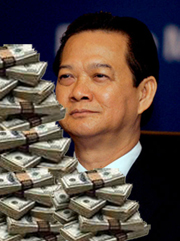
Tình trạng lạm phát gia tăng làm khổ dân nghèo ngay bây giờ, nhưng khi nhìn về tương lai, lạm phát cũng là một mối đe dọa vì giới đầu tư quốc tế sẽ ngần ngại không dám vào Việt Nam. Trong năm qua, số tiền ngại quốc đầu tư đã tăng vọt sau khi Việt Nam được vào Tổ Chức Thương Mại Thế Giới. Nhưng ông Peter Rider, giám đốc quỹ đầu tư Indochina Capital cho biết sau một thời gian “hồ hởi” giới có tiền quốc tế đã khựng lại, không hăng hái như trước nữa. Công ty Standard and Poor tuần trước mới báo tin là nếu tỷ lệ lạm phát ở Việt Nam không giảm bớt thì trong vài năm tới “mức độ tín nhiệm sẽ bị giảm” (creditworthiness could be eroded). Ông Pincus, đại diện của Liên Hiệp Quốc, cũng cảnh cáo rằng số đầu tư nước ngoài sẽ giảm nếu lạm phát không được kìm hãm.
Muốn kìm hãm lạm phát thì chính quyền Cộng Sản Việt Nam phải giảm bớt quyền tiêu tiền của các cán bộ cầm đầu những xí nghiệp quốc doanh, giảm bớt quyền cho vay của các ngân hàng do các đảng viên nắm giữ! Nhưng hiện nay đảng Cộng Sản Việt Nam nằm trong tay giới tư bản đỏ này chứ không phải do các đảng viên thấp cổ bé miệng quyết định. Cắt bớt quyền lấy tiền của dân đem dùng thì các quan chức bị thiệt, họ theo đảng “làm cách mạng” để làm gì? Ðó là cảnh khó khăn của ông Nguyễn Tấn Dũng. Ðảng Cộng Sản kiểm soát kinh tế, không mở cửa thị trường tự do thật sự; tạo ra cơ hội cho các đảng viên cao cấp làm giầu. Bây giờ rất khó hạn chế bớt “quyền làm giầu” của các nhà tư bản đỏ! Lạm phát tăng lên sẽ gây khó khăn cho cả nền kinh tế, những người chịu thiệt hại nặng nhất là đám dân lao động chứ không phải các nhà tư bản đỏ! (Người Việt;Thursday, March 06, 2008)
Ngô Nhân Dụng
FT Interview: Nguyen Tan Dung
Published: March 2 2008 22:28 | Last updated: March 2 2008 22:28
Amy Kazmin, the FT’s South-East Asia Correspondent, and Victor Mallet, Asia Editor, interviewed Nguyen Tan Dung, Vietnam’s Prime minister. Below is an edited transcript of their interview
Financial Times: When you look at the international situation, there’s a lot of concern about a possible recession in the US and indeed a global economic slowdown. A lot of countries in Asia are concerned about this, and I am wondering how you in Vietnam are going to be able to deal with this, and in particular whether you think you can meet your target for growth this year of 9 per cent in these difficult circumstances?
Nguyen Tan Dung: A recession in the US economy, as well as a slowdown of the global economy, will lead to bad effects on world economies, including Vietnam’s. In 2007, the value of Vietnam’s exports was more than US$50bn, accounting for more than 60 per cent of our GDP. Total trade accounted for 160 per cent of our GDP.
With a slowdown of the global economy, the market for Vietnam’s exports would be more difficult. Vietnam’s exports to the US in 2007 reached more than US$10bn, accounting for 20 per cent of our total exports.
Given that context, we have exerted efforts to reach the goal of GDP growth of 8 per cent to 9 per cent per year and we have come up with the following major solutions. Firstly, Vietnam has become a full member of the World Trade Organisation and this is a favourable setting for Vietnam to expand export markets, not only to the US, EU, Japan, China, but also to the large markets of the Middle East countries and African countries.
We are striving to achieve the goal of 20 per cent export growth this year and I think this is a possible mission because in the first two months of this year, export growth has hit 30 per cent.
FT: Sure. So from that I gather that you’re pretty confident about the overall state of the economy, even with a US slowdown. Do you think you are able to both continue to have high growth, that you have spoken about, and control inflation, which I think is obviously another important target that you have?
NTD: Before I respond to this question, I would like to say that we will keep economic growth of 8 per cent to 9 per cent by the strategy of diversifying and expanding export markets and apart from that we will also encourage domestic investment. We have been encouraging strong investment from all economic sectors, including the private sector and state owned enterprises, and we also encourage investment from households, and we encourage the investment of the public sector, and we also strongly encourage foreign investment….
In 2007…. disbursed FDI capital was US$8bn, [which] constitutes an important momentum for the economic growth of Vietnam.
We are also very pleased with the remarkable progress in the trade and investment cooperation and relationship between the United Kingdom and Vietnam. In 2007, our two-way trade value was $1.7bn, an increase of 21 per cent against 2006 and this year this figure will increase more than 20 per cent. And in terms of investment from the UK to Vietnam, British businesses have invested in 99 projects totalling nearly US$1.5bn and 50 per cent of this committed capital has been paid in. And I believe that there are very promising prospects for British investment in Vietnam this year and the years ahead.
FT: Diversifying trade, domestic investment, these are all very much pro-growth policies, if you like, which will clearly support Vietnamese economic growth in the future. Is there not a danger that they will also be essentially helping to stoke inflation? How are you going to be able to tackle inflation at the same time as maintaining all these pro-growth policies that you’ve spoken about?
NTD: I’m very interested in controlling inflation, because our government set the target to grow at 8 per cent to 9 per cent but in combination with controlling inflation in Vietnam, because we will not let high inflation affect our growth and our development…
I think we should look at the overall picture in the world with the recession of the global economy, the high price of raw materials, the depreciation of the US dollar and the fluctuation and volatility of other strong currencies in the world, as well as natural disasters, epidemics and the high price of crude, and all these elements have strongly affected inflation in Vietnam and led to high food prices in Vietnam. These are the external reasons for high inflation in Vietnam, and are also badly affecting Vietnam’s economy. But from our side, in 2007 there have been shortcomings in the management of monetary policy in Vietnam.
We increased credit so fast… Banks in Vietnam, they want to achieve higher growth, so they increase their credit growth and loans to business and the private sector, and therefore that affected monetary management in Vietnam.
For example, [money supply] increased by 46 per cent in 2007 against 2006. Credit growth has increased by 53 per cent in 2007 against 2006 and given the context, our GDP grew at 8.5 per cent. If we look at 2006, the GDP of Vietnam grew by 8.2 per cent and the [money supply] increased by 26 per cent and the figure for credit growth was 27 per cent.
With targeted GDP growth of 8 per cent to 9 per cent this year, we will control inflation by tightening monetary policy. We will conduct a prudent and flexible fiscal policy and monetary policy in order to reduce credit growth and [the money supply] to less than 30 per cent.
FT: In reversing this excessive credit growth that you have spoken of, isn’t there a risk that with a very dramatic reversal there are going to be lots of sorts of shocks on the system? These efforts to tighten are having quite a dramatic effect, I think, on corporate life, from what I understand. Are you worried about that?
NTD: Yes, I agree with you because in order to control inflation, we also reduce credit growth and money supply by raising interest rates and in the last couple of weeks that also affected the investment and development of corporations in Vietnam.
But I think this is the right thing….It helps us to remove inefficient projects and to upgrade… [and] enhance the effectiveness of businesses. And I think all these measures to reduce credit growth and to reduce money supply…will not affect healthy projects.
As for the stock exchange and real estate, we will continue to provide loans to borrowers in order to encourage the healthy development of those markets.
FT: You talk about money supply and reining in credit growth. Some of the big borrowers in the system domestically have been state-owned enterprises, which have been borrowing a lot for a lot of expansion. Does the government feel that it needs to control borrowing by state-owned enterprises a bit more, because you also mention at the same time that you are encouraging investment by state-owned enterprises, so isn’t all this pulling in different directions?
NTD: Vietnam is a market economy therefore the banks in Vietnam operate in accordance with the principles and rules of a market economy and there is no intervention from the government for loans or borrowings….
Recently, we tightened monetary policy and we raised interest rates, and I think that will help good businesses to continue their healthy projects and to remove all the inefficient projects.
FT: I want to turn, if I may, to political matters. Is further democratisation, political reform, necessary, do you think, to achieve your economic aims, and if so, what kind of reforms might the Communist party and the government be prepared to implement?
NTD: Before I answer your question I would like to act on one point ….We have exerted efforts to control the inflation rate this year, to bring it lower than in 2007.
FT: Keep it below 2007?
NTD: I mean less than 12 per cent….Now I would like to turn to political matters. As you know, Vietnam is in the process of comprehensive reforms….aimed at building Vietnam into a wealthy country, strong country, with a rich people and a democratic, just and advanced society….
For the last 22 years, our GDP has grown by 7.5 to 8 per cent a year. And we have managed to shift our economy from a planned economy to a market economy and we have succeeded in integrating broadly and deeply into the international economy. And the most success for Vietnam is the membership of the WTO and Vietnam’s conclusion of various agreements on bilateral trade cooperation with most of the countries and territories of the world….
In the past we followed the economic model of the Soviet Union and Eastern European countries. After 20 years of reform, we have achieved high growth for many consecutive years… Social welfare has been brought to the poor and the poor have benefited from development. The prevalence of poverty in the population has been reduced from 60 per cent in 1993 to 14 per cent and Vietnam has also managed to fulfil most of the Millennium Development Goals, even prior to the deadline….
We have managed to achieve political and social stability….and our country has been stable for many years. Our population has put their confidence in the leadership of the party, state and government. Political reforms have been conducted along with economic and social reforms, and we have turned Vietnam into a law-governed state and a state for the people by the people and of the people. And the paramount right belongs to our people. For example, the National Assembly of Vietnam represents the voice and the power of our people.
…. In conclusion I would like to say that the political reforms in Vietnam have been conducted continuously in the last years in accordance with the cultural, economic and social reforms as well as in line with the historical background of Vietnam, and all the Vietnamese people always agree with the guidelines and policies by our leadership and 87m Vietnamese people have agreed with the leadership of our state, party and government.
FT: Can I just ask a specific question? Obviously the Soviet economic system that you mentioned has clearly been abandoned. I think there are a lot more questions about whether you have really abandoned the Soviet political system. Do you think there could ever come a day, for example, when the Communist Party of Vietnam could change its name on the grounds that obviously economically it is no longer communist in the ideological sense?
NTD: As you know, the name of the party of Vietnam is the Communist Party of Vietnam and our party has been selected by the decision of our people and has been established in line with the social and historical background in Vietnam…
I think the change of our party’s name would be decided by our people. The Vietnamese people always support the Vietnamese Communist Party because of the goals that our party set out, as I stated to you, to build Vietnam into a strong country, with a wealthy people and a democratic, just and advanced society.
…We should look at the past 80 years; we should look at the history of Vietnam and when the Communist Party of Vietnam was founded in order to lead the Vietnamese people to struggle for independence, freedom and unification. And we were also under the domination of French colonists and the Americans, and it took us nearly a century, and it took also millions of Vietnamese people’s lives in order to regain our freedom and independence.
For the last 20 years the Communist Party of Vietnam has succeeded in leading the Vietnamese people to shift from a centrally planned economy to a market economy with so many important achievements. Therefore, with the evidence and the practices that the Vietnamese Communist Party has done in the past, the Vietnamese people put their confidence in the party and support the party.
FT: I would like to ask a personal question actually…. You had an early political career and an early military career. When you look back to your youth, did you think you would ever get to be prime minister of a united Vietnam? When you come to retire what would you like to have achieved as prime minister of Vietnam?
NTD: I joined the People’s Armed Forces in 1961 to 1984, and I was also a soldier in the southern battle of Vietnam during the resistance against the Americans. I went to the battlefield in order to regain national independence. And I also joined the combat in the western and southern battlefields in Vietnam, and I also joined the operations to help the Cambodian people to get rid of the genocidal [Khmer Rouge] regime.
When I was in the army, there were four times that I was wounded. I also got more than 30 wounds on my body and my injuries were ranked on the second rank of invalids. The first rank is the most severe. So, that means that I had lost more than 60 per cent of working capability.
FT: You seem to be much better now!
NTD: I touch on this issue because I try to explain to you that at that time, I couldn’t imagine that I could survive or that I could help our Cambodian friends to get rid of the Khmer Rouge regime. And at that time, I had never thought that I would be the prime minister of Vietnam…..
According to the labour code of Vietnam, the age of retirement is 60, and this year I am already 59. That means, in accordance with the law, I only have one year left.
FT: I’m sure they will ask you to stay on.
NTD: And I think my retirement will be upon the decision of our people and the national assembly, because for our cabinet, tenure would last from 2007 to 2011…And as the prime minister and during my term and together also with the members of our cabinet, I will do the following missions.
Firstly, we will continue to ensure high economic growth for Vietnam, from 8 per cent to 9 per cent per year in consecutive years. Secondly, we will focus on improving the living standards of our people and upgrade social welfare, especially in terms of improving our educational and healthcare systems. We will reduce the prevalence of poverty in Vietnam down to less than 10 per cent.
Thirdly, we will build the government of Vietnam to be a government, a healthy and strong government in order to prevent and to remove corruption. Fourthly, our mission is to keep political stability, along with democracy for all. And moreover we will also focus on the mission of maintaining national defence and security. Fifthly, Vietnam will be a market economy with deeper integration into the world economy, and Vietnam will be a reliable friend and partner with all countries and peoples in the world striving for peace, stability and development.
These are the missions that I, myself, and the members of my cabinet will do and try to do during my term, and I believe that we will be able to make all these missions a reality.
FT: These are very heavy responsibilities. I was wondering what keeps you awake at night. Is it the spectre of inflation or is it bird flu or is it the Chinese navy? There are so many areas that you have to worry about. What are the ones that concern you most?
NTD: In the capacity as prime minister of the government I know this is a heavy mission, but I believe that we can realise all our missions under the leadership of the Communist Party of Vietnam. We are also not over-optimistic about the development future of Vietnam, but I believe that it has a bright future.

